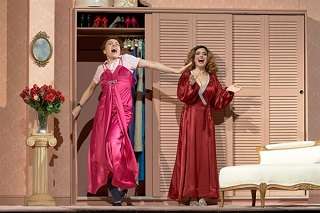|
Back
Roman Intrigue in Texas Sevilla
Teatro de la Maestranza
02/11/2020 - & February 13*, 15, 2020
George Frideric Handel: Agrippina, HWV 6
Matthew Brook (Claudio), Ann Hallenberg (Agrippina), Renata Pokupic (Nerone), Alicia Amo (Poppea), Xavier Sabata (Ottone), João Fernandes (Pallante), Antonio Giovannini (Narciso), Valeriano Lanchas (Lesbo), Serena Pérez (Giunone)
Orquesta Barroca de Sevilla, Enrico Onofri (conductor)
Mariame Clément (stage director), Marcos Darbyshire (stage direction updating), Julia Hansen (sets & costumes), Bernd Purkabek (lighting), fettFilm (video)

A. Hallenberg, A. Amo (© Guillermo Mendo)
Handel’s operas are probably among thoset hat benefit most from changes of setting and epoch. Possibly because most operas written before Gluck’s reforms of the genre were basically a procession of showpieces for the star singers and the libretto a pretext for a mythological or historical setting. Starting with Gluck (1714-1787), the libretti of the operas did matter, hence the transposition to a different period is not always successful with more recent operas. Among Handel’s 50 or so operas, Giulio Cesare, Rodelinda, Alcina, Rinaldo and Agrippina are his most appealing and most frequently performed. In addition to a large number of memorable arias, Agrippina’s plot is exceptionally good, especially for the epoch. His second composition to be written in Italy, it’s hard to believe the composer was just twenty-fourwhen he wrote such amaturework.It premiered in Venice at Carnival, where L’incoronazione di Poppea had premiered some six decades earlier. It shares both setting and cynicism with the earlier Monteverdi opera. The libretto was written by Cardinal Vicenzo Gramani for the 1709-10 Carnival in Venice. It is thought that Gramani used the opera Agrippina to parody Pope Clement XI, with whom he did not agree. They sided with opposite parties in the War of the Spanish Succession, with Gramani supporting the Hapsburgs and the Pope, France and Spain. Emperor Claudius, Agrippina’s husband, is supposedly a parody of Pope Clement XI.
In this opera, following the false news that Emperor Claudius has drowned, his wife Agrippina tries different ruses and seductions to ensure her son from a previous marriage, Nero, is named Emperor. Stage director Mariame Clément chose to change the setting to present day Texas, where Claudius is C.E.O. rather than Emperor. The change of epoch works and probably appeals to a middle-aged public familiar with the American series Dallas and Dynasty. Power is power, no matter what epoch. The stage was divided into two sections: a lower half where the action takes place, and an upper half with videos alluding to the action, often with a comical or cynical twist. This was sometimes amusing, but it was overall irritating. Luckily, it was not too distracting, as the action on stage was almost always riveting.
Overall, the singers were good. Xavier Sabata’s Ottone was initially tentative with an unappealing “Lusinghiera mia speranza” but improved as the opera progressed. His “Voi che udite il mio lament” was both technically solid and moving. Portuguese bass-baritone João Fernandes impressed as Pallante. His two demanding arias, “La mia sorte fortunate” and “Col raggio placido della speranza”, were valiantly sung. Bass-baritone Matthew Brook was well cast as Claudius thanks to his ability to portray an extremely cynical Emperor. His “Pur ritorno a rimirarvi” was tenderly and movingly sung, while two arias, “Cade il mondo soggiogato” and “Io di Roma il Giove sono”, show the almost comically pompous side of power. Usually sung by a counter-tenor, Nerone was sung by mezzo Renata Pokupic who had the right voice for the role. With Ottone and Narciso sung by counter-tenors, it was perhaps judged wiser to opt for vocal variety. Initially timid, Pokupic progressively became the unstable young Nero. Her second aria “Qual piacere a un cor pietoso” was especially moving. Given the Croatian mezzo’s agile coloratura, the arias “Con saggio tuo consiglio” and “Coll’ardor del tuo bel core” were brilliant. Stage director Clément chose to evoke the son’s perverse desire for his mother, which was not inappropriate given the monstrous creature he eventually turned into. Counter-tenor Antonio Giovannini, cast as Narciso, was not at the level of the rest of the cast. His technique was poor and did not allow him to project his voice. Though his was a minor role, Valeriano Lanchas excelled as Lesbo, the Emperor’s servant, brilliantly transformed into a convincing chauffeur-pimp.
Of course the uncontested stars of the show are Agrippina and Poppea, both excellently performed by Swedish mezzo Ann Hallenberg and Spanish soprano Alicia Amo. Though written for a soprano, the title role has been recently taken over by mezzos, with mixed results. In the case of Hallenberg, the result is simply brilliant. She mesmerized from the moment she appeared on stage. She has the required stage presence to portray the ambitious Empress. Vocally, most of her role does not lie in the stratosphere, a register reserved for Poppea. Her arias are the most melodious in the opera; “L’alma mia fra le tempeste”, “Ho un non sò che nel cor”, “Ogni vento ch’al porto la spinga” and especially “Non ho cor che per amarti” are among Handel’s most beautiful arias. Beyond vocal mastery, Hallenberg conveys the necessary imperiousness of a Machiavellian aristocrat. Given that Poppea is bestowed with as many arias as Agrippina, it’s important that she not steal the show. The young Spaniard Alicia Amo sang well, especially the famous “Vaghe perle, eletti fiori” and the catchy “Bella pur nel mio diletto.” Despite her beauty, ductile coloratura and convincing acting, she remained a coquettish, though shrewd, soubrette, no match for the ambitious Empress. Thanks to the brisk tempi of the Orquesta Barroca de Sevilla under the baton Enrico Onofri, and also thanks to the strong cast and creative staging, this show, lasting more than four and a half hours, was never less than engrossing.
Ossama el Naggar
|